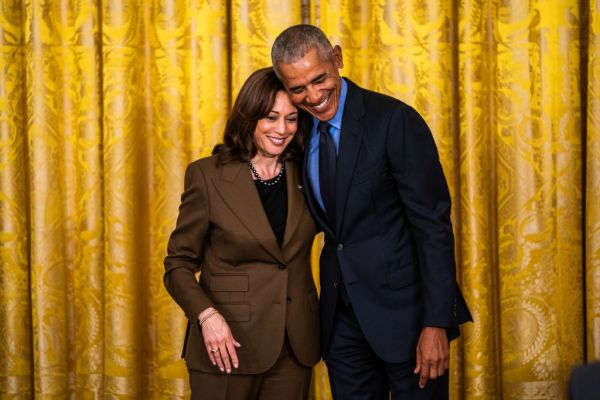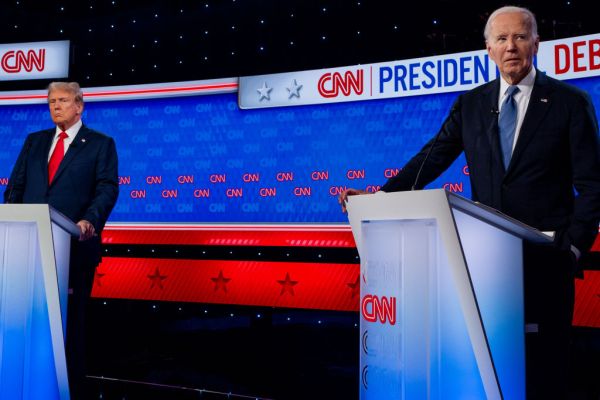It’s a political cliche to say Republicans cannot win the youth vote, that young, rebellious Americans want nothing to do with either social or economic conservatism. Self-restraint and financial prudence are admittedly not the usual hallmarks of a youthful attitude. And given the near-universal leftward tilt of American higher education, it is no surprise the youth vote follows that tilt. In 2008, for example, Barack Obama beat John McCain among voters 18 to 29, 66 percent to 31 percent.
Donald Trump’s arrival onto the political scene would not, conventional wisdom tells us, change that dynamic. And yet, as the 2024 election unfolds, it has become increasingly possible that Donald Trump could win more votes among young men.
Poll after poll showed Trump closing that gap with President Joe Biden when the latter was the Democratic nominee, and there is little reason to think Vice President Kamala Harris will be terribly more attractive to these voters. More recent polling from the Young Men Research Initiative conducted by YouGov shows Harris up a mere 38 percent to Trump’s 36 percent among young men ages 18 to 29. According to the same data, Biden was barely beating Trump, 34 to 33 percent. But when the independent Robert F. Kennedy Jr. was factored into the race, Trump pulled ahead of both Biden and Harris by one or two percentage points.
Trump was poised to have a real shot with young men against Biden, and he might still be against Harris—though it’s worth pointing out that a general surge in Democratic enthusiasm could eat away at it. A new Pew poll conducted between August 5 and August 11, for example, found Harris had a 24-point lead among men ages 18 to 29. And yet it’s undeniable that young men’s rightward trend has cropped up in other polls and that the Trump campaign believes the group is gettable. (Why else cozy up with Hulk Hogan and Dana White?) That’s notable in an era when the Democratic Party assumes itself as the youthful party.
All of this raises the question: Why would Donald Trump, of all people, be the Republican to appeal to young men?
It’s not because they’re embracing conservatism. As public opinion scholar Daniel A. Cox wrote for the Survey Center on American Life in February, “young men shifting away from the Democratic party does not necessarily indicate they are becoming more conservative.” On issues like abortion and gay marriage, young men continue to lean leftward along with their female cohorts. Nor does increasing GOP affiliation, Cox posits, signal approval of the GOP itself. Cox’s report notes that “more than six-in-ten (62%) of young men have a negative view of the GOP.”
Perhaps this is part of Trump’s appeal. His heterodox positions relative to the GOP line, and his open contempt for the party, give him a rebellious image that young men find enticing. Among fellow Gen-Zers, I have heard many times from friends and acquaintances over the years that Trump’s fighting character is refreshing to see in a politician. Ditto his break from political orthodoxies. A close friend—who is also a soldier—told me he supported Trump because of his opposition to further American intervention in the Middle East. Another—one deeply disturbed by the events of January 6—admitted to me that come November there is a coin-flip chance he will vote for Trump because gas under the former president was $2.
Perhaps Trump’s womanizing brashness has its appeal. Perhaps he’s cultivated an image of a swashbuckling entrepreneur that strikes young men as adventurous and exciting. And whatever one might think of his character, it’s impossible to deny that Trump has grit. The image of him standing triumphant, fist in the air and brave grimace on his face, immediately after an attempt on his life demonstrates a bravery born not of deeply held morals or a sense of duty, but of sheer stubborn will. Perhaps for young men that is enough.
On a deeper level, though, Donald Trump’s growing appeal to young men is reflective of society’s growing indifference to them.
Across American society, young men fall behind their female counterparts, with little in the way of concern outside conservative circles. One million fewer men attend college today than in 2011. In K-12 education, decades of underperformance by boys have resulted in negligible changes to our education system. Developments in popular culture, too, threaten to leave young men behind. A glaring example today is the explosion of online gambling since 2017, which is particularly addicting among young men and is already showing signs of harming their financial state. Communal activities are also declining, leaving young men more and more isolated.
And yes, the internet has exacerbated these problems. If young men, however, crave adventure and excitement, they need a real frontier to explore—with mentors to guide them. Instead, they have been set loose to explore a digital frontier unsupervised, often to their physical, mental, and moral detriment.
Modern American society makes men without chests, leaves them alone to struggle with the aftermath of this hollowing, and then is shocked when they turn to a toxic counterculture. The growing popularity of internet personalities like Andrew Tate, Nick Fuentes, and the Bronze Age Pervert is bewildering to those who reside in the real world, but young men (and young adults in general) increasingly inhabit the online world. Forty-three percent of teen men say they’re online almost constantly—out of sight of their real-world companions and at the mercy of men like Tate, Fuentes, and BAP. No one can defend these men on their merits, but they have something going for them that few others do today: They speak to young men where they are.
They also, almost in lockstep, support Donald Trump. Even someone like Jordan Peterson—whose message to young men is far healthier than that of a man like Tate—defends the Republican presidential candidate. It should be no shock that the young men who follow these personalities are also embracing Trump. However bad the image of masculinity these men sell is, to the young man desperate for guidance it is better than no image at all.
Whether these dynamics result in Donald Trump winning more votes from young men in November remains to be seen. But until society as a whole makes clear that indifference to men isn’t an option—and better alternatives for young men to look up to are presented—there’s no reason to think young men will cease shifting rightward.






Please note that we at The Dispatch hold ourselves, our work, and our commenters to a higher standard than other places on the internet. We welcome comments that foster genuine debate or discussion—including comments critical of us or our work—but responses that include ad hominem attacks on fellow Dispatch members or are intended to stoke fear and anger may be moderated.
With your membership, you only have the ability to comment on The Morning Dispatch articles. Consider upgrading to join the conversation everywhere.